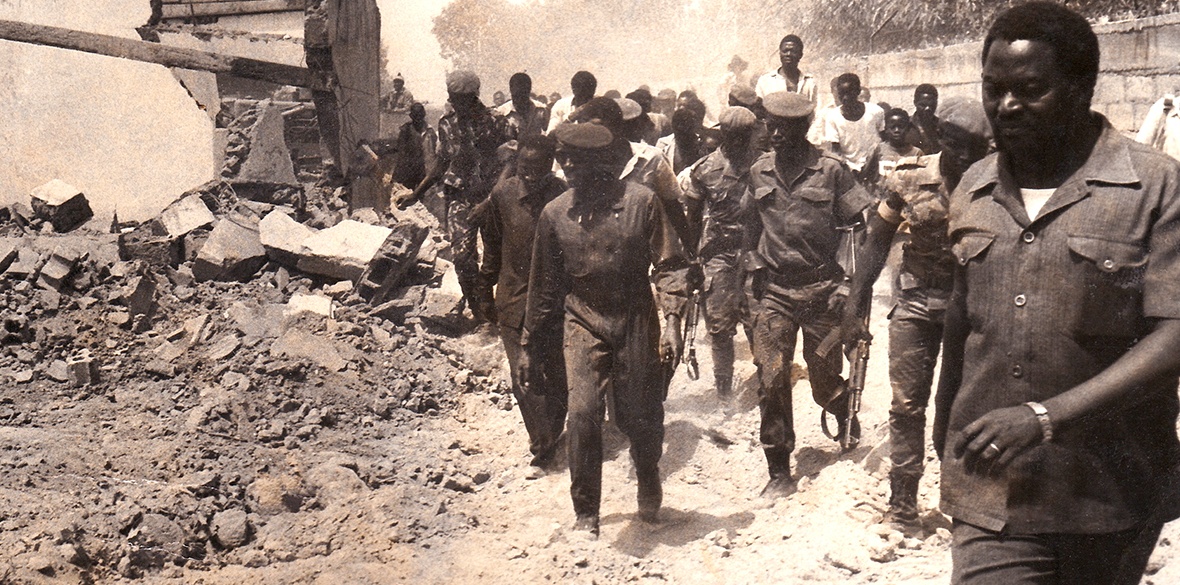This is the last article you can read this month
You can read more article this month
You can read more articles this month
Sorry your limit is up for this month
Reset on:
Please help support the Morning Star by subscribing here
THOMAS SANKARA was on Brian Peterson’s radar from Africa history classes in 1991 when, he tells me, he seemed “a rare bright spot” in the African history of the 1980s.
Peterson’s first book investigated the Islamisation of southern Mali and how a whole population switched religions during the colonial period. It involved the systematic gathering of oral histories but when he returned on sabbatical in 2012, the presence of jihadist groups made the work unsafe.
Switching his attention to Burkina Faso, he began a grassroots study of Sankara’s revolution and realised that there is neither a basic outline of it or Sankara’s life. “Basic narrative and chronologies of major African figures haven’t been written, because historians avoid biographies. But a basic political biography of Sankara was essential.”
The task was very different from writing the biography of a Western leader. What little archive material that might exist was destroyed following a coup by Blaise Compaore, Sankara’s former second in command, who was only deposed following massive protests in 2014.
Even after the coup things were slow to change. “It was weird,” he says. “People were waiting. Blaise had gone but the regime was still intact. Lots of people spoke to me but only on condition of anonymity.”
Peterson traced members of Sankara's family, now living in Washington DC, and through the State Department he gained access to the former US ambassador to Burkina Faso, Leonardo Neher, and an archive of diplomatic cables. These helped to construct a picture of how wider geopolitical forces manoeuvred around this marginal country during the cold war.
In Burkina Faso a vital source was Valere Some, one of the principal ideologues of the revolution and a survivor of torture under Compaore, who died in 2017. A chess opponent of Peterson, he was “super erudite. He had a Phd in anthropology and a combative personality.”
One night, a week before the coup of September 16, 2015, Some called him in a panic. “Get to the airport and take any plane out,” he told Peterson. The Compaorist faction, lead by Sankara’s assassin Gilbert Diendere, were planning another coup to stop the first free elections and they might know about his research. Peterson left.
But, astonishingly, both Compaore and Diendere were evicted by a huge mobilisation of mass protest — the spirit of the revolution, it seems, might still be alive on the streets.
Peterson hopes that the upcoming trial in absentia of Compaore, announced recently, will be a watershed. “There has been a lack of resolution for so many years,” he says. “We need a better understanding of the role of France and they must declassify the archive.
“So far, Macron has resisted that. But it’s in France’s best interest to be transparent, to disclose and move forward if they don't want to be perceived as an imperialist overlord.”
For Burkinabe youth, and more widely in Africa, Sankara is a saint, a political hero. Do they really understand the revolution? “Sankara himself was a student of revolution,” Peterson replies, “‘and he wasn’t naive.
“He knew what had happened in other countries where the experiment with African socialism had gone off the rails, like Guinea under Toure or Benin under Kerekou. He criticised them for violations of human rights. His regime was very bloodless: less than a dozen people were killed.
“The revolution was pedagogical. They released political prisoners and the revolutionary tribunals made very lenient punishments. When there were excesses, he addressed them. He admitted the errors of the revolution and had an ideological flexibility that is very unusual.”
The four years from 1983-87 are a short time and, for Peterson, Sankara’s whole agenda was in the right direction: anti-corruption, anti-imperialist, democratic and popular: “I admire how he was committed to ideals, justice, gender equality, limiting neocolonial control and redesigning the political architecture. He didn't compromise on any of it.”
As proof, he points to the creation of basic healthcare — a clinic in every village — and the “commando” vaccination programmes of two million people in two weeks which have never been bettered, even now in times of Covid.
And yet the book tells the story of a military leadership that alienated the civilian left and made itself vulnerable to a military coup from within that abandoned progressive values. “He purged a civilian leadership that was cut from the same cloth ideologically and preserved the military core,” he says.
“The others didn’t know what they were doing in respect to Marxism. They had spent their lives in garrisons and trained as soldiers to defend the neocolonial system. And they had grievances: Sankara had redirected resources away from the military and towards the rural population.”
Someone like Some looked back with regret, Peterson says, and admits that handing the military the weapons to destroy the PAI — the biggest left-wing civilian party — was a mistake and disastrous for the revolution.
“And when they talk about Sankara’s death, these men have tears in their eyes.”
Thomas Sankara: A Revolutionary in Cold War Africa by Brian Peterson is published by Indiana University Press, £26.99.












